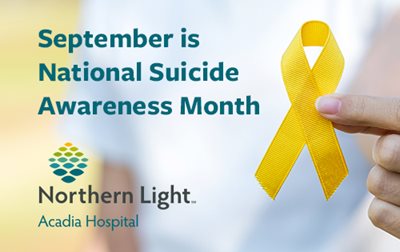
September is Suicide Prevention Awareness Month
When you see a friend or loved one battling depression or ideating self-harm or suicide, it can be overwhelming to emotionally unpack these feelings and to find help for them. Today, we have more tools to help prevent suicide than ever, and last year, the U.S. Department of Health & Human Services introduced a new easy-to-remember number for the Suicide & Crisis Lifeline: 988.
This year, as we enter National Suicide Awareness Month, Northern Light Health is working to increase awareness of 988 among Mainers as a resource to help those who are struggling with a mental health crisis, emotional distress, or suicidal thoughts.
“Sadly, anyone can be at risk for suicide, but the good news is, it’s preventable,” says Anthony Ng, MD, DFAPA, medical director, Community Services, Northern Light Acadia Hospital. “The fact is most people with suicidal thoughts are asking for help and would like the chance to discuss their reasons for living. By listening, providing information and resources and, most of all, talking openly about such suicidal thoughts with trained counselors, we can help those in crisis avoid making a choice that will forever change the lives of those who love them.”
Since it was introduced in July 2022, the crisis counselors working with 988 have fielded millions of calls, chats, or texts each month. In June alone, counselors answered more than 350,000 988 inquiries. Like dialing 911, 988 lines are open 24 hours a day, seven days a week, 365 days a year.
People of all genders, ages, and ethnicities can be at risk for suicide. Warning signs that someone may be at immediate suicidal risk include:
• Talking about wanting to die or wanting to take their own life
• Talking about feeling empty or hopeless or having no reason to live
• Talking about feeling trapped or feeling that there are no solutions
• Feeling unbearable emotional or physical pain
• Talking about being a burden to others
• Withdrawing from family and friends
• Giving away important possessions
• Saying goodbye to friends and family
• Putting affairs in order, such as making a will
• Taking great risks that could lead to death, such as driving extremely fast
• Talking or thinking about death often
Other serious warning signs that someone may be at suicidal risk include:
• Displaying extreme mood swings, suddenly changing from very sad to very calm or happy
• Making a plan or looking for ways to end their own life, such as searching for lethal methods online, stockpiling pills, or buying a weapon
• Talking about feeling great guilt or shame
• Excessive use of alcohol
• New or increased drug use
• Acting anxious or agitated
• Changing eating or sleeping habits
• Showing rage or talking about seeking revenge
If you know someone who is exhibiting one or more of these warning signs, don’t hesitate: Call 988. It could make a world of difference to someone you know or love.
For more information and resources on how you can make a difference for loved ones in your life who may be struggling, visit northernlight.org/behavioral.